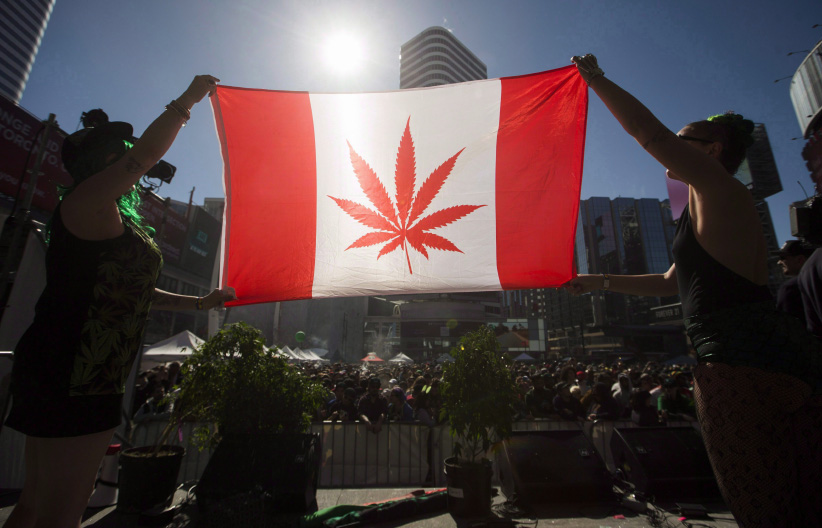Three key questions on legalizing marijuana, answered (sort of)
Top federal Liberals on what the provinces will do, whether new impaired driving rules are constitutional, and how pot taxes will be handled
It’s nothing short of a sea change in public policy, one with profound implications for everything from Canadian culture and health to border security, road safety and even international relations: legalizing marijuana. Two people hold a modified design of the Canadian flag with a marijuana leaf in in place of the maple leaf during the “420 Toronto” rally in Toronto, April 20, 2016. (Mark Blinch/CP)
Share

The proposed laws the federal government released today on legalizing marijuana raise at least as many questions as they answered. At a news conference, the top Liberals on the file offered responses of, let’s say, varying precision on three big, obvious areas of concern:
1. What will the provinces do?
A lot of major decisions—including exactly how recreational marijuana will be retailed—are left to the provincial governments. Reporters asked if any province whose government really didn’t like the idea of legal pot couldn’t just make its sale so cumbersome or costly that it would amount to continued prohibition. Bill Blair, former Toronto police chief, parliamentary secretary to the justice minister, and Prime Minister Justin Trudeau’s point man on the pot file, gave this answer:
“I’ve had quite a bit of discussion in all of the provinces and territories… And there’s an overwhelming consensus that we need to do a better job of protecting our kids and getting organized crime out of this out of this business. We recognize that in order to take organized crime’s influence out of this market, we’re going to have to not only to maintain strict criminal sanctions for their activities, but provide a new regulated regime for production and distribution, which is competitive in price, quality and access.”
2. Can the crackdown on impaired driving survive a court challenge?
As part of the Liberals’ approach to pot, they’re overhauling the law, not only for driving while stoned on cannabis, but also for driving when drunk on alcohol. Police will no longer need any particular reason to be suspicious before demanding a roadside breath test for alcohol. They will, though, be allowed to demand a saliva sample, to test for drugs, only when they “reasonably suspect that a driver has drugs in their body.” Justice Minister Jody Wilson-Raybould was asked if that new breath-test power might be struck down as a violation of the Charter of Rights and Freedoms. Her answer:
“We have with this bill, if it passes Parliament, one of the strongest impaired-driving pieces of legislation in the world, and I’m very proud of that. Ensuring that we have safety on our roads and our highways is of paramount concern. I will, as I do with all just as pieces of legislation, be tabling a Charter statement. I am confident of the constitutionality of the mandatory roadside testing. This is not a device or a tool that does not exist in other places in the world. In fact, mandatory roadside testing in many countries has significantly reduced the number of deaths on highways.”
3. Will any taxes collected on legal pot be poured back into addiction research or public education?
The federal government made no commitments on how it plans to tax marijuana, or perhaps split the revenue windfall with the provinces. But Public Safety Minister Ralph Goodale, himself a former finance minister, ruled out dedicated taxes, while offering vague assurances of adequate funding for those priorities. Goodale’s reply:
“The Minister of Finance never ties certain revenues to certain programs…. But the issues that you have raised with respect to addictions and prevention measures, making sure police have the proper tools and training to do what they need to do—all of those are high priorities for us as we proceed with the implementation. Many of them will require discussion with the provinces because there are there are joint roles to be played here, but very clearly we recognize our obligation to make sure that this regime is properly financed and properly supported to make sure it is effective, and get to the main objectives: keep [marijuana] out of the hands of our kids and make sure we’ve stopped the flow of illegal cash to organized crime.”